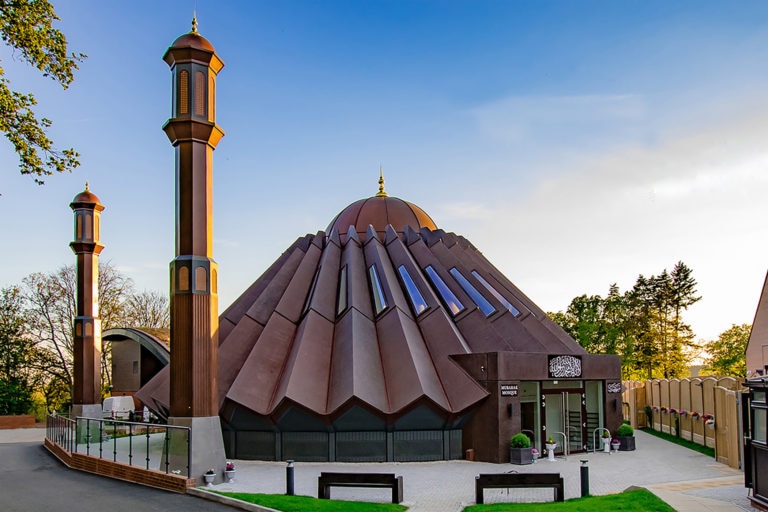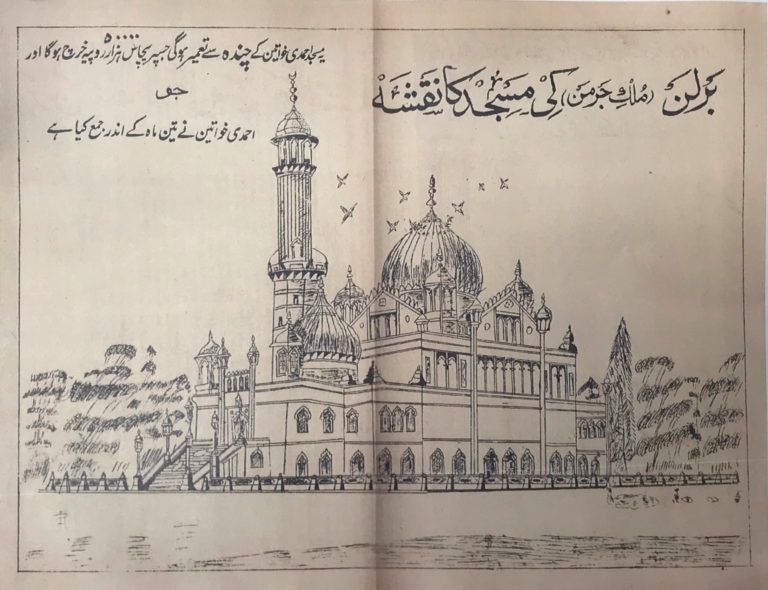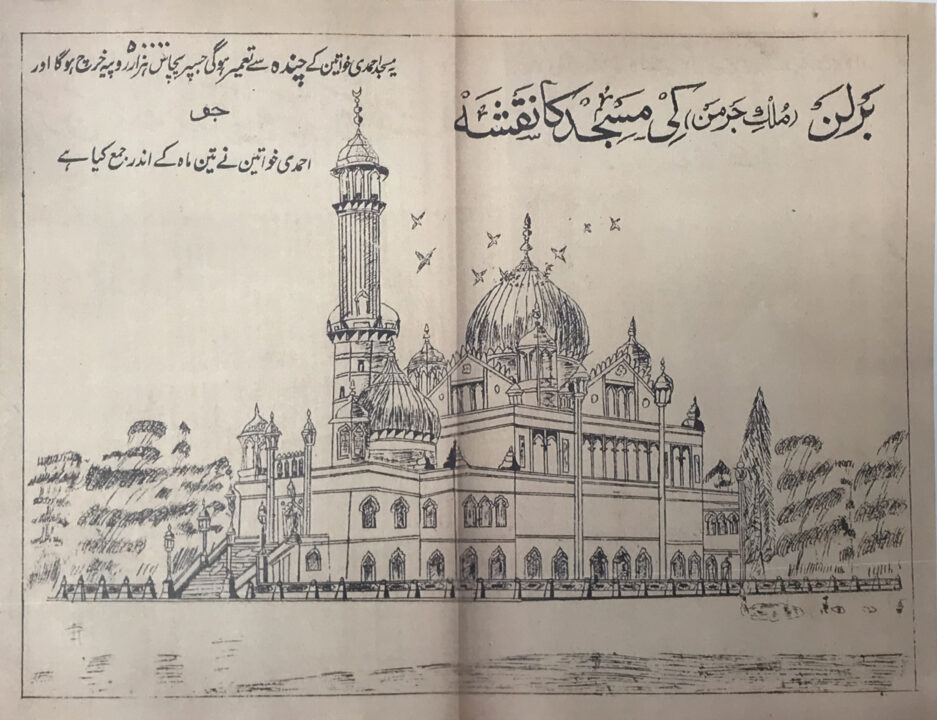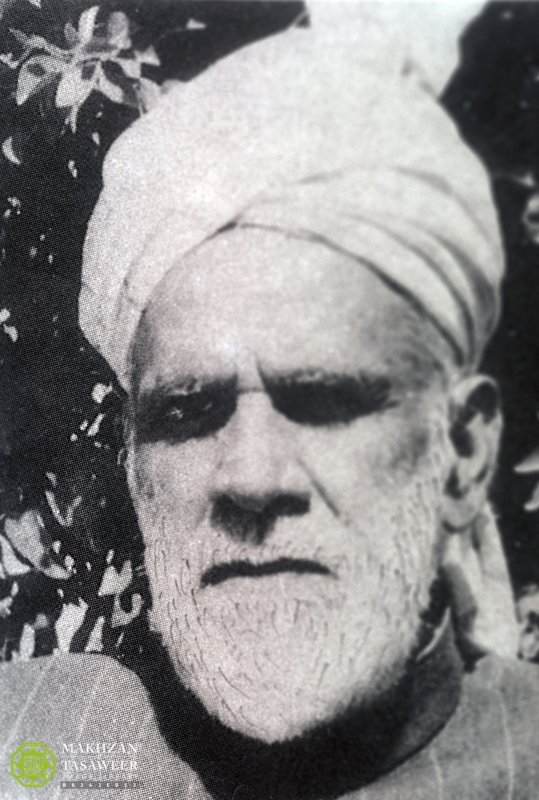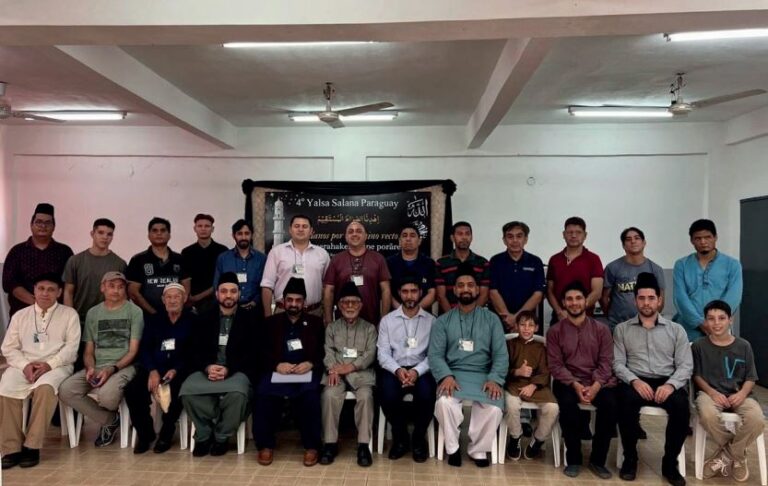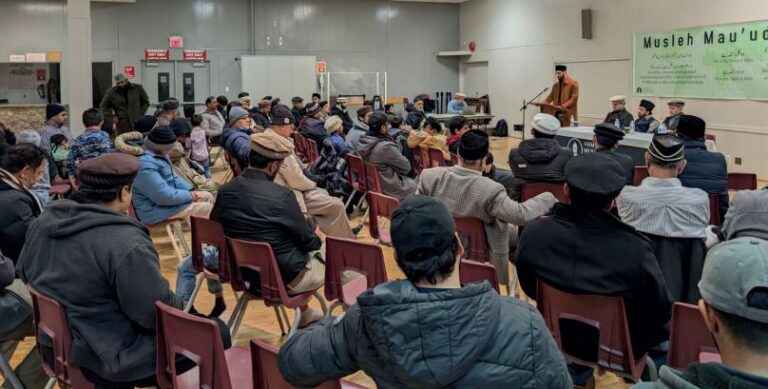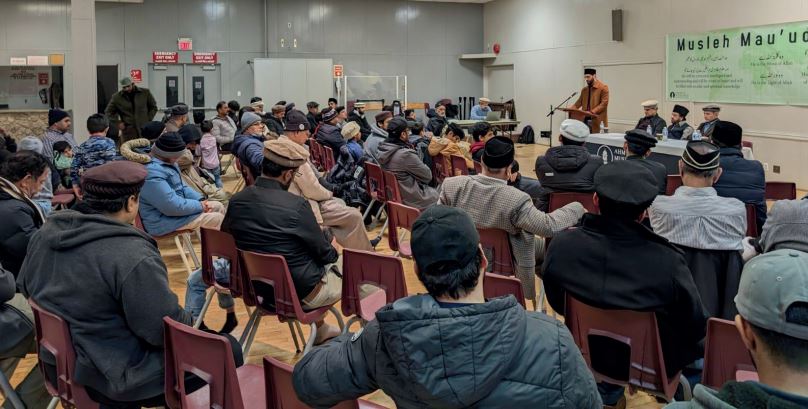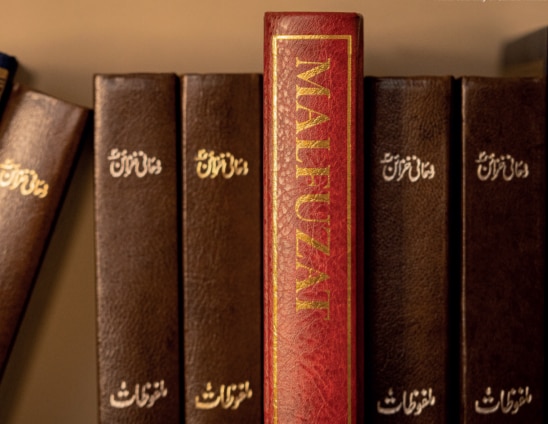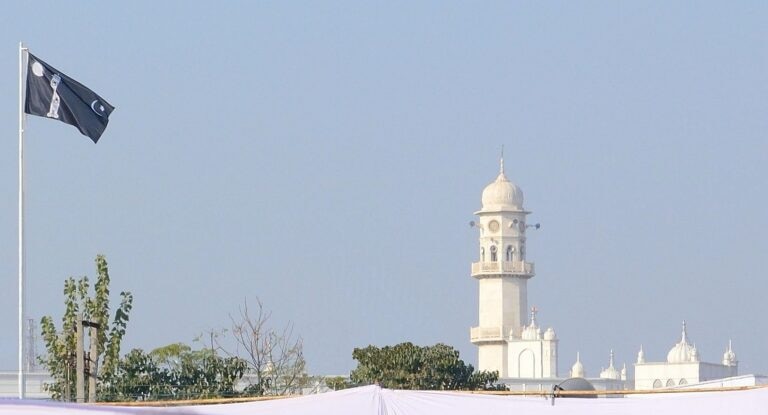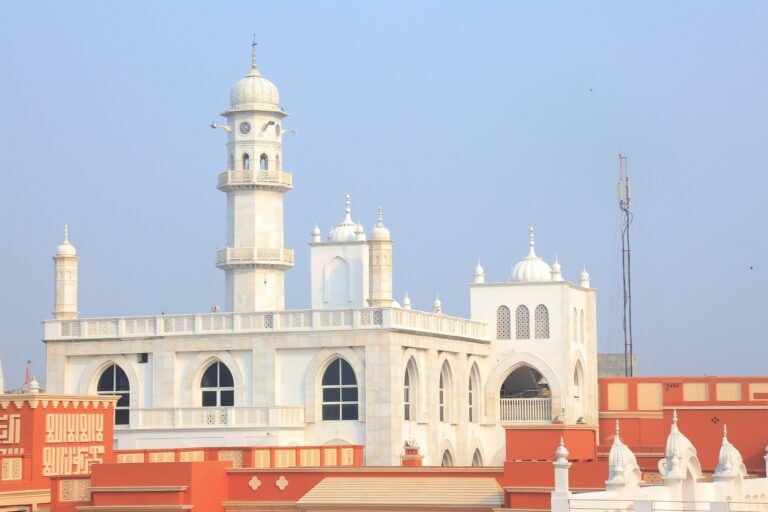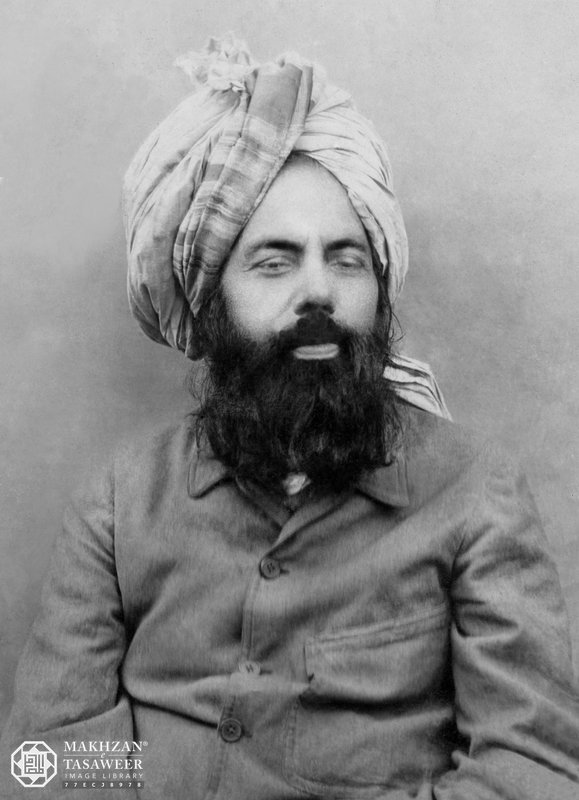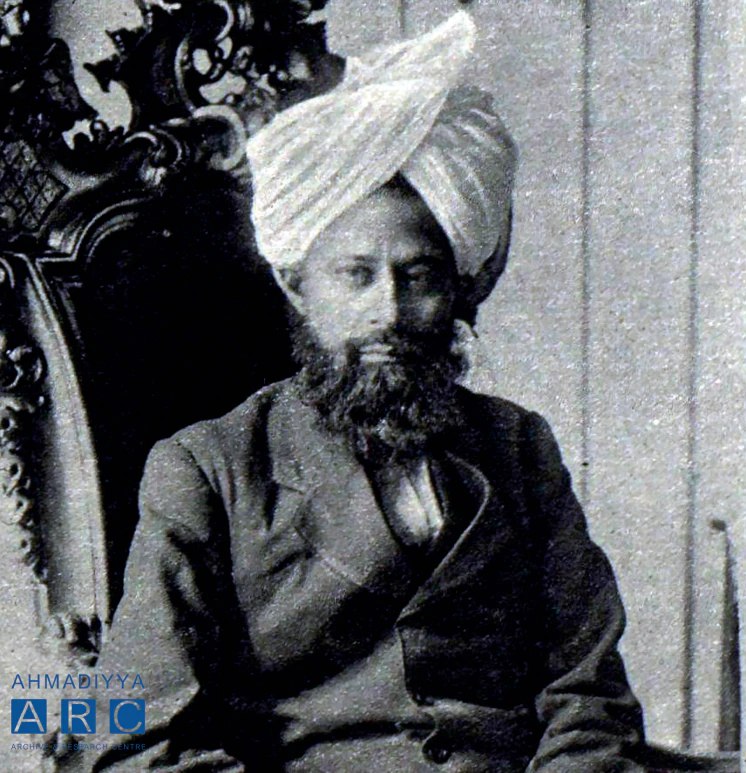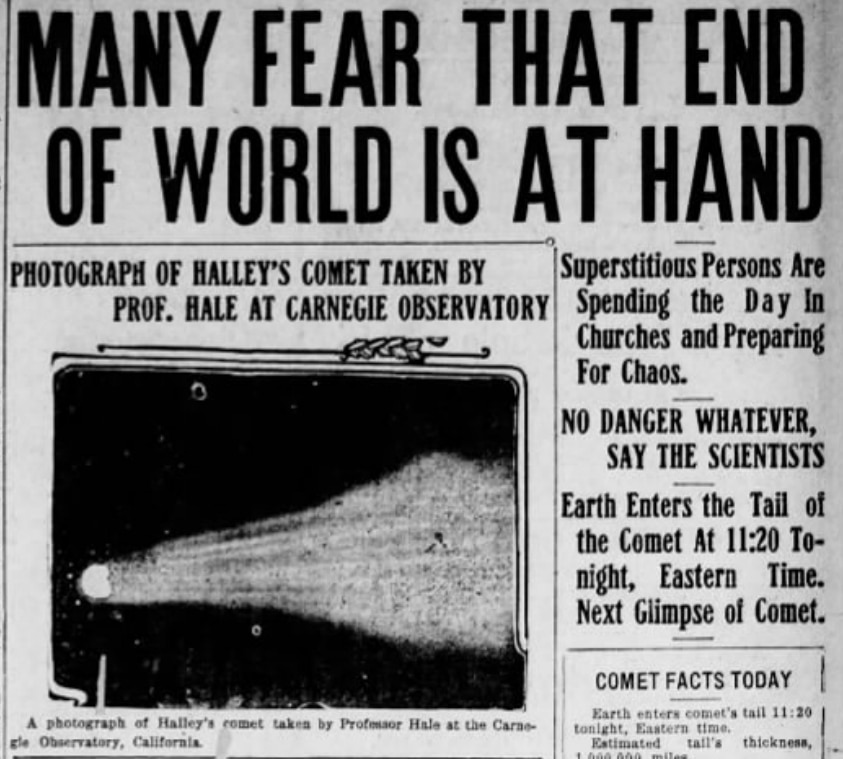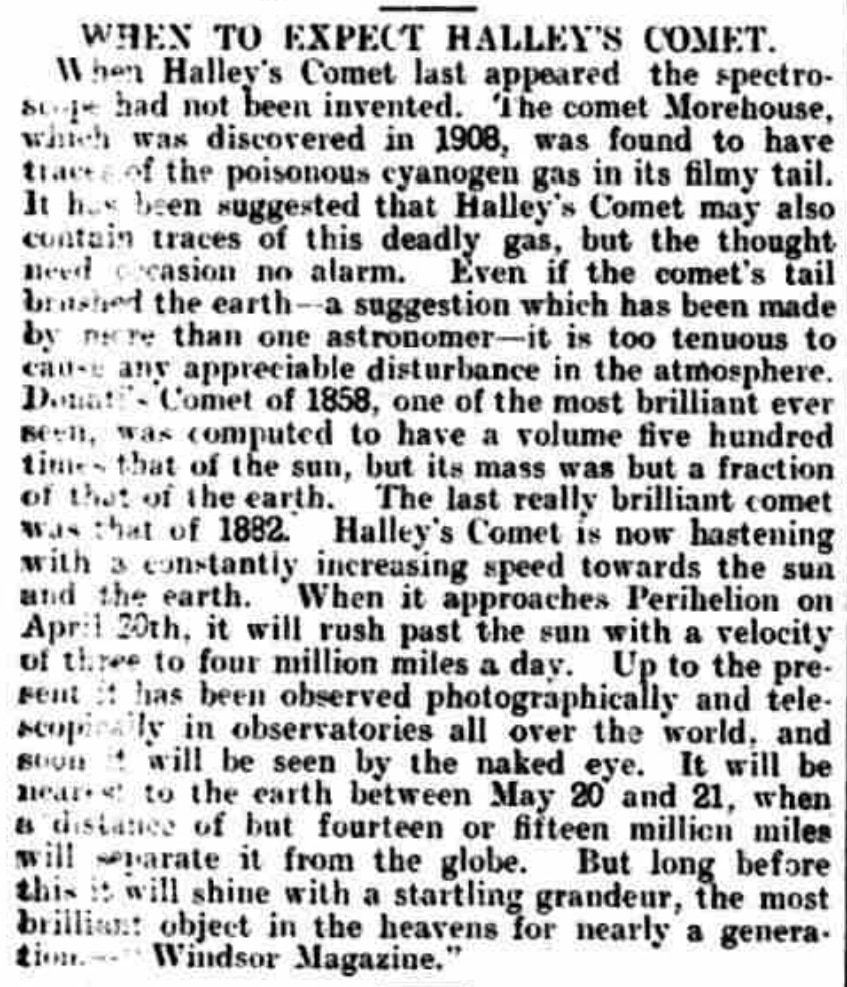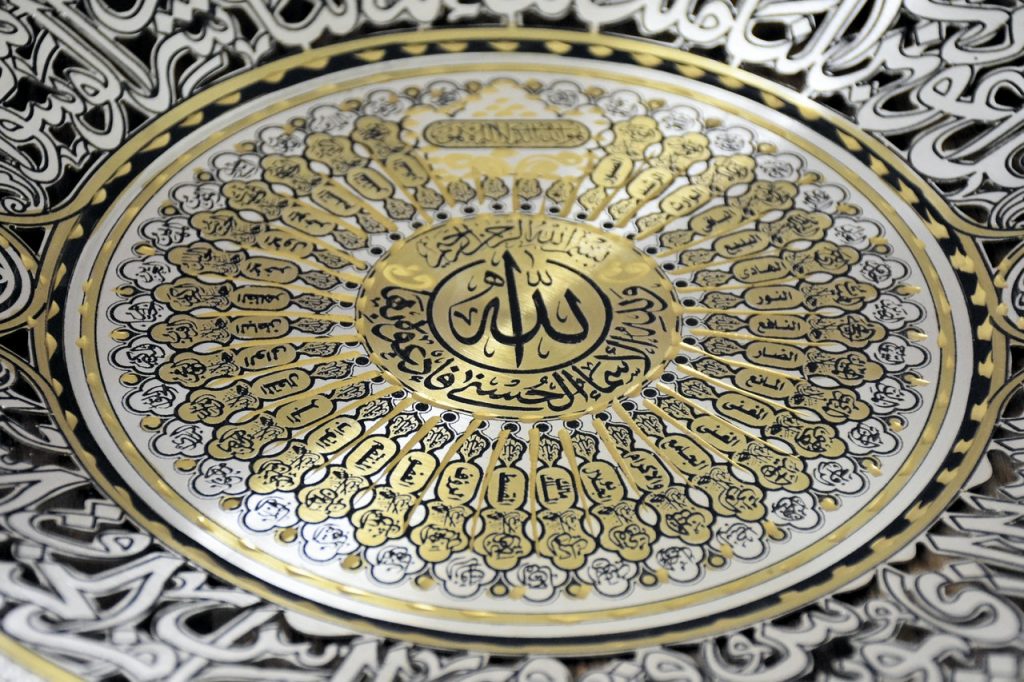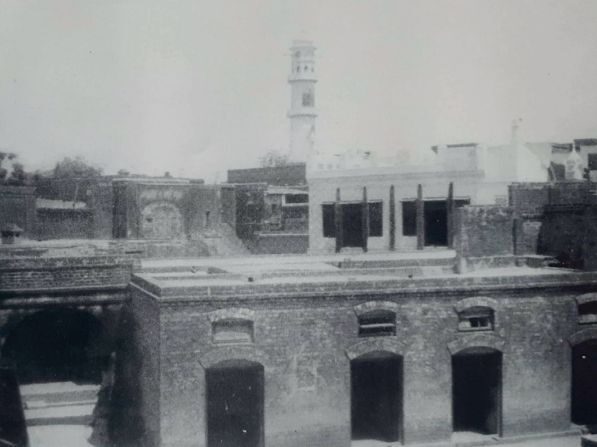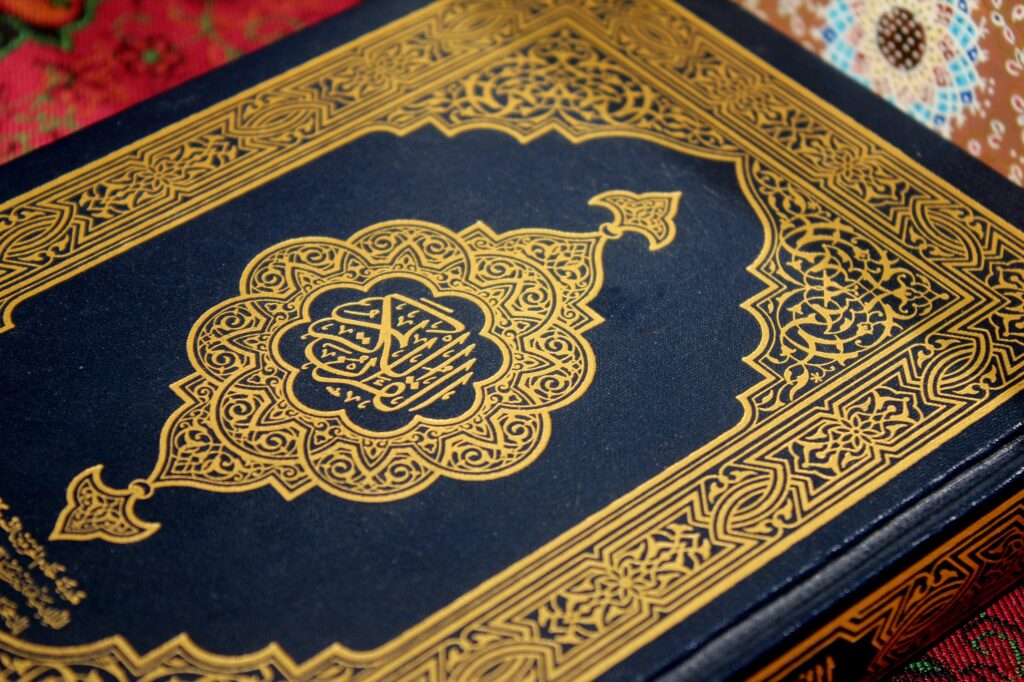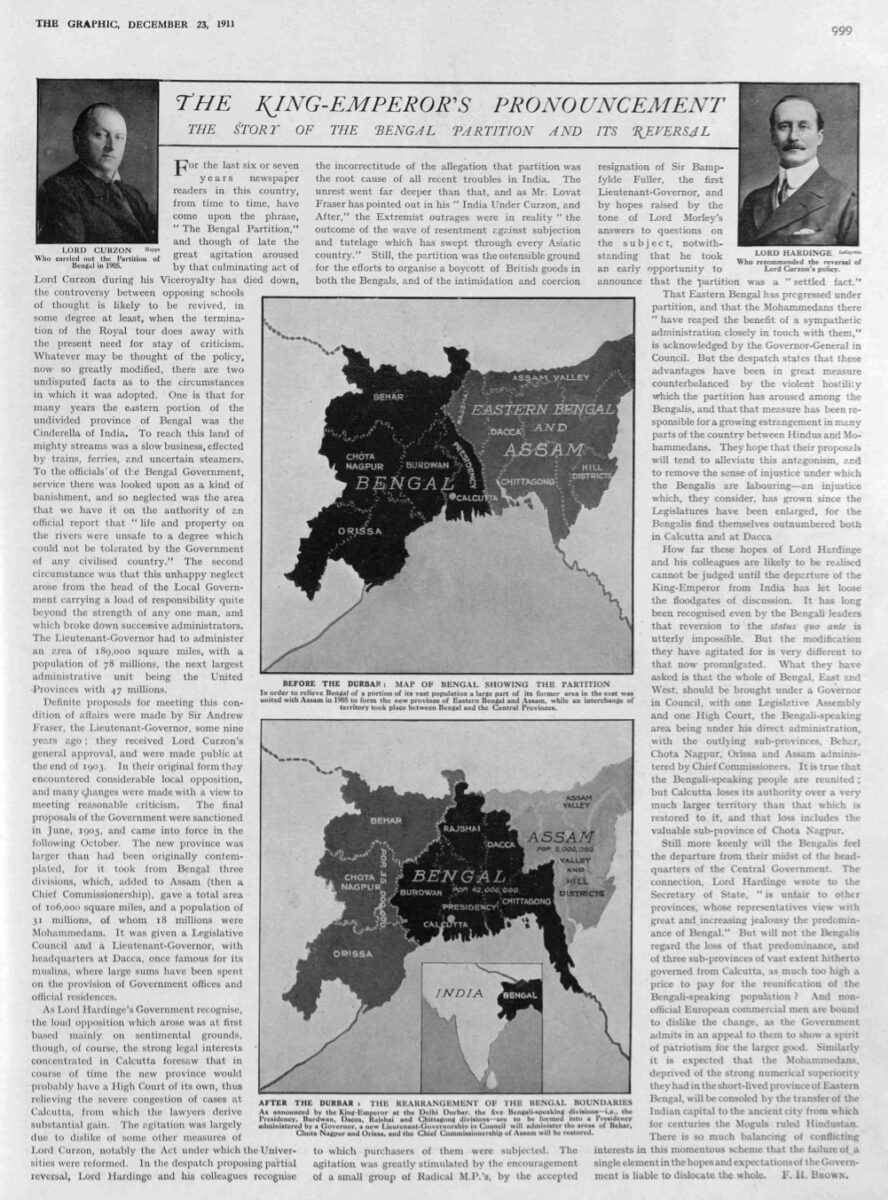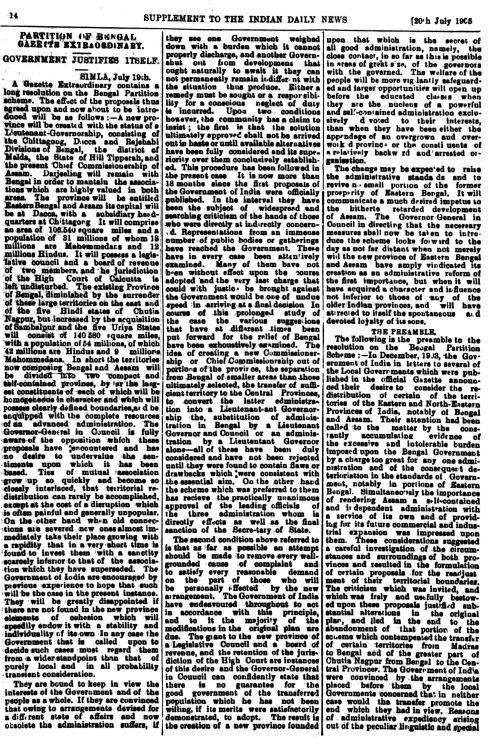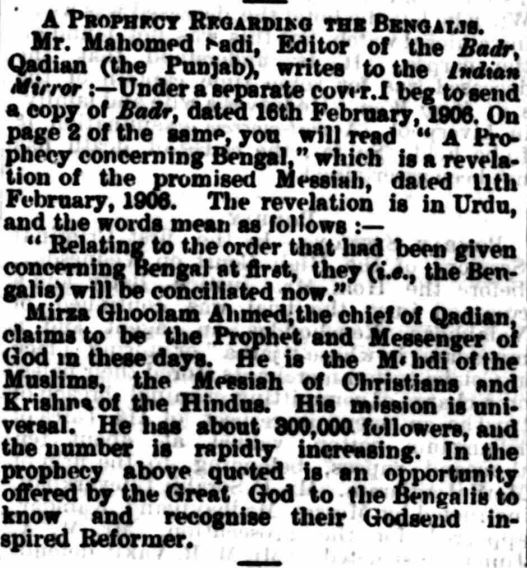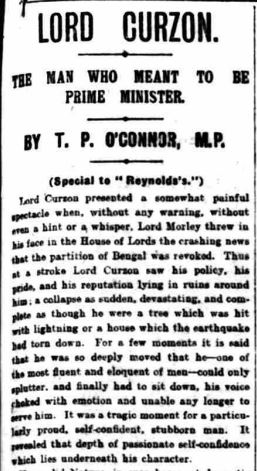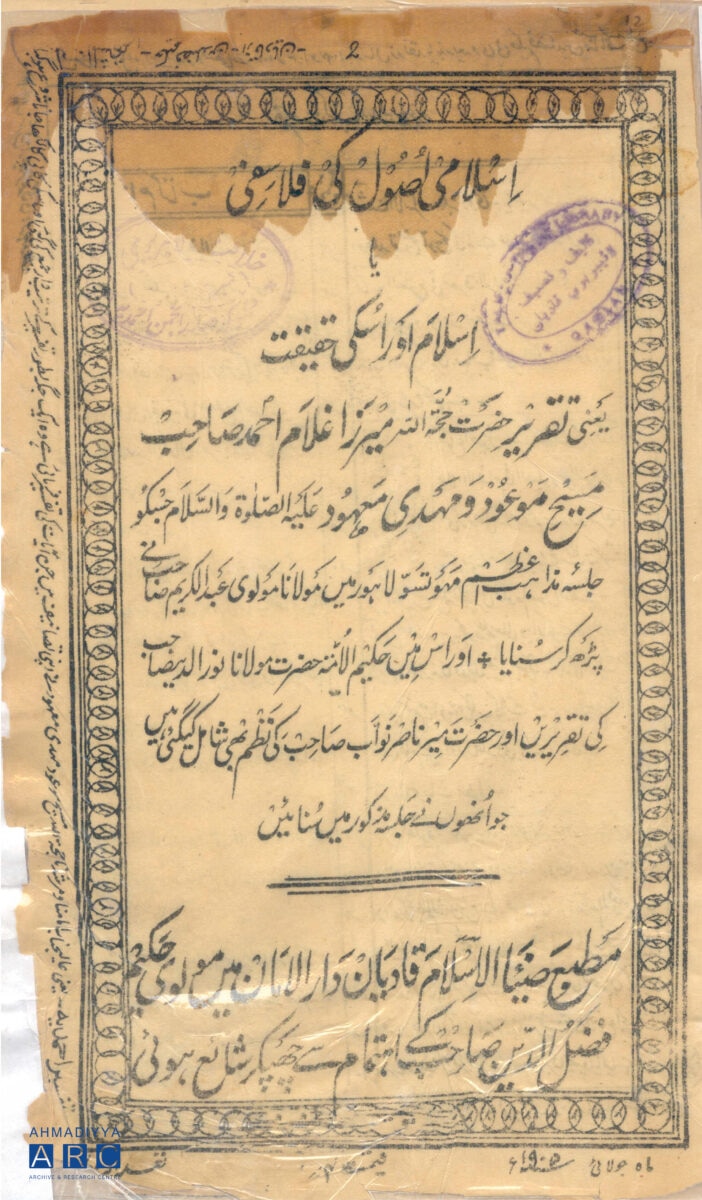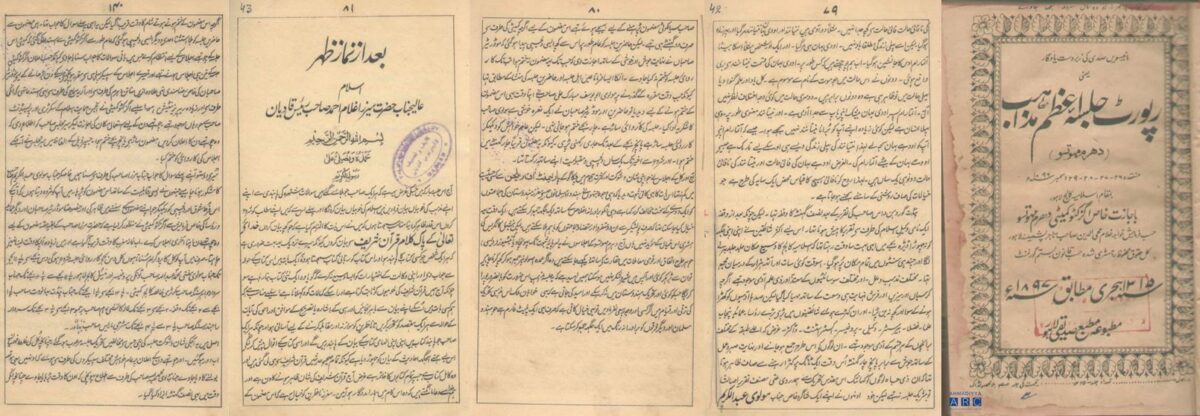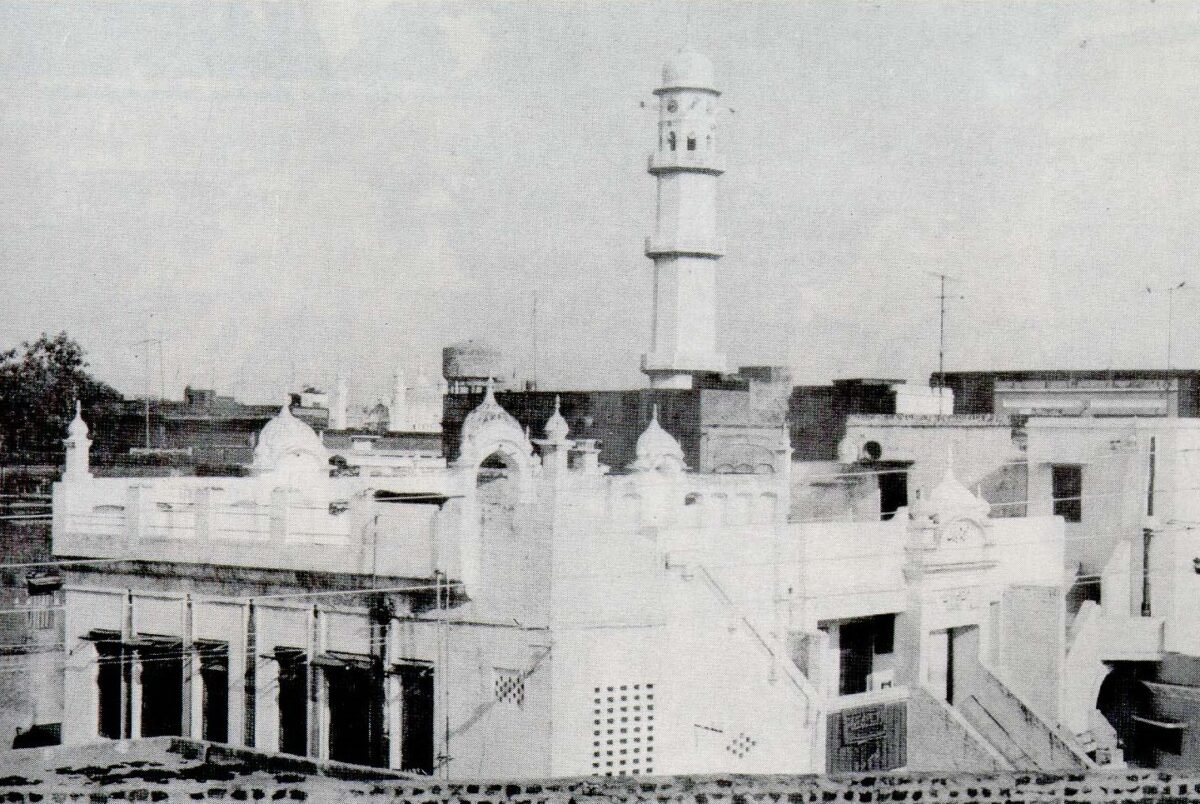Friday Sermon
1 March 2024
Muhammadsa: The Great Exemplar
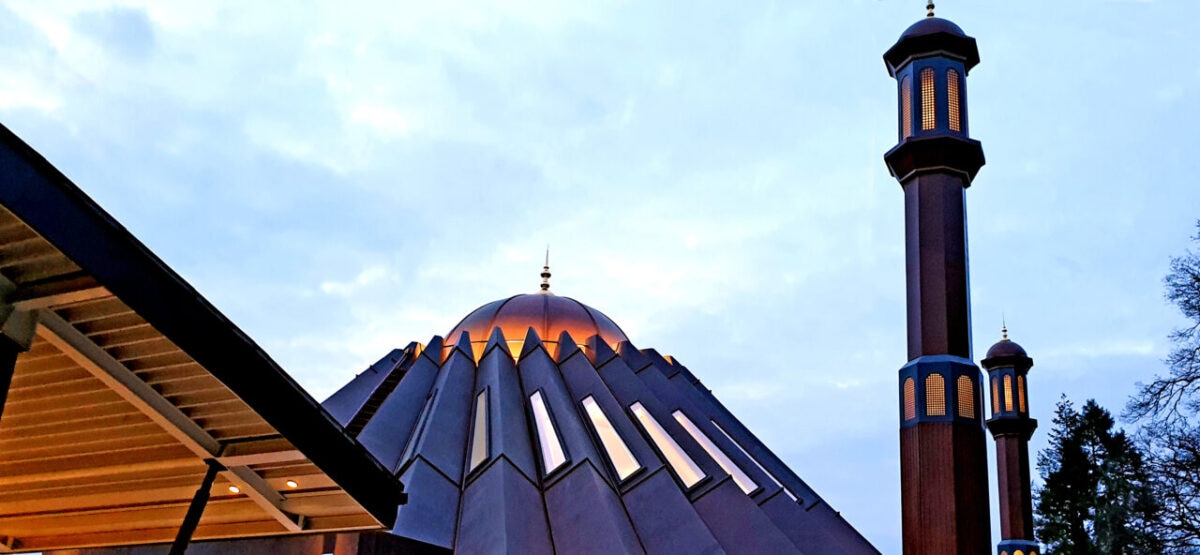
After reciting the tashahhud, ta‘awwuz and Surah al-Fatihah, Hazrat Khalifatul Masih Vaa stated:
With regards to incidents relating to the Battle of Uhud, Hazrat Musleh-e-Maudra states:
“The Holy Prophetsa gathered the wounded and the martyrs. The wounded were treated and arrangements were made to bury the martyrs. At that time, the Holy Prophetsa came to know that the cruel disbelievers of Mecca had mutilated the bodies of some of the martyrs. Among those who were mutilated was his paternal uncle, Hamzahra, as well. The Holy Prophetsa was saddened upon witnessing this and said, ‘Through their own actions, the disbelievers have made the act of revenge against them lawful, which we considered unlawful.’ However, the Holy Prophetsa received a revelation from God Almighty at that moment that he should let the disbelievers do as they want, but that he should always hold fast to the mantle of mercy and justice.” (Deebacha Tafsir-ul-Quran, Anwar-ul-Ulum, Vol. 20, pp. 254-255)
This is the teaching of Islam.
In relation to the burial and funeral of Hazrat Hamzahra it is mentioned that Hazrat Hamzahra was wrapped in a single sheet of cloth. I have briefly mentioned this in the past as well. In fact, I have done so in detail; but some details were left out. When Hazrat Hamzah’sra head was covered, both of his feet would lay bare and when the cloth was pulled towards his feet, his face would become uncovered. Upon this, the Holy Prophetsa instructed for his face to be covered and to place Harmal or Idhkhar grass over his feet. Hazrat Hamzahra and Hazrat Abdullah bin Jahshra, the nephew of Hazrat Hamzahra, were buried in the same grave. The Holy Prophetsa led the funeral prayer of Hazrat Hamzahra first. This is according to the narration of At-Tabaqat-ul-Kubra. (Ibn Sa’d, Al-Tabaqat al-Kubra, Vol. 3 [Beirut, Lebanon: Dar al-Kutub al-‘Ilmiyyah, 1990], pp. 6-7; Ahmad bin Hanbal, Musnad Ahmad bin Hanbal, Vol. 7, Hadith 21387 [Beirut, Lebanon: ‘Alam al-Kutub, 1998], p. 72)
As far as the discussion of whether or not the funeral prayers of these martyrs were offered, I have already spoken on this in the previous sermon.
The Holy Prophetsa prohibited the Muslims from howling and shrieking over the deceased and he did this in an extremely wise manner. In a narration, it is related by Hazrat Abdullah bin Umarra that when the Holy Prophetsa returned from the Battle of Uhud, he heard that the wives of the Ansar were crying and wailing over their husbands. The Holy Prophetsa said, “What is the matter? Is there no one to weep for Hamzah?” When the women of the Ansar came to know of this, they gathered to wail and shriek in lamentation over the martyrdom of Hazrat Hamzahra as well. Later on, the Holy Prophetsa went to take some rest. He was perhaps at a distance from them in the mosque. When he woke up, the women were still wailing in that very same manner. The Holy Prophetsa said, “Will they continue crying over Hamzah today? Will they not stop? Tell them to return!” Following this, the Holy Prophetsa instructed them to return to their homes and not wail or howl over the death of anyone after that day. (Ahmad bin Hanbal, Musnad Ahmad bin Hanbal, Vol. 2, Hadith 5563 [Beirut, Lebanon: ‘Alam al-Kutub, 1998], pp. 418-419)
Hence, in this manner, the Holy Prophetsa prohibited them from wailing over their dead and did away with any form of wailing and howling in this manner over the dead. In this way, with great wisdom, the Holy Prophetsa remained very considerate of the sentiments of the wives of the Ansar. Instead of preventing them from mourning over the loss of their husbands and brothers, he mentioned Hazrat Hamzahra and stated that there was no one to weep for him.
The Holy Prophetsa was extremely saddened to see the corpse of Hazrat Hamzahra mutilated after his martyrdom, but when he saw that the women of the Ansar were not stopping from wailing, and so in order to bring this custom to an end – this was one of their ancient customs – he presented his own example and instructed them to remain patient. It was such an instruction that was very effective. As for the Holy Prophet’ssa grief from losing Hazrat Hamzahra, he continued to mention him till the end.
In his eulogy upon the martyrdom of Hazrat Hamzahra, Hazrat Ka’b bin Malikra said, “My eyes shed tears, and rightly so after the demise of Hamzah. But what good will come from shrieking, crying and wailing over the loss of the lion of God? That lion of God was Hamzah, and the morning he was martyred, the world spoke up that this martyr was indeed a valiant one.” (Ali Ibn al-Athir, Usd al-Ghabah fi Ma’rifat al-Sahabah, Vol. 3, [Beirut, Lebanon: Dar al-Kutub al-‘Ilmiyyah, 2003], p. 69)
In relation to the burial of Hazrat Mus’abra, it is mentioned that when the Holy Prophetsa reached his body, he was lying face down. The Holy Prophetsa stood next to him and recited the verse:
مِّنَ ٱلۡمُؤۡمِنِينَ رِجَالٞ صَدَقُواْ مَا عَٰهَدُواْ ٱللَّهَ عَلَيۡهِ ۖ فَمِنۡهُم مَّن قَضَىٰ نَحۡبَهُۥ وَمِنۡهُم مَّن يَنتَظِرُ ۖ وَمَا بَدَّلُواْ تَبۡدِيلٗا
“Among the believers are men who have been true to the covenant they made with Allah. There are some of them who have fulfilled their vow, and some who still wait, and they have not changed their condition in the least.” [33:24]
Thereafter, the Holy Prophetsa stated:
إِنَّ رَسُوْلَ اللّٰهِ يَشْهَدُ أَنَّكُمُ الشُّهَدَاءُ عِنْدَ اللّٰهِ يَوْمَ الْقِيَامَةِ
“The Messengersa of Allah bears witness that you will be the martyrs before Allah on the Day of Judgement.”
Whilst addressing the Companions, the Holy Prophetsa then stated, “Visit him and send peace upon him. By the One in Whose hand is my life, he shall respond to whoever sends peace upon him until the Day of Judgement.”
Hazrat Mus’ab’sra brothers Hazrat Abu Rum bin Umairra, Hazrat Suwaibit bin Sa’dra and Hazrat Amir bin Rabi’ahra lowered his body into his grave. (Ibn Sa’d, Al-Tabaqat al-Kubra, Vol. 3 [Beirut, Lebanon: Dar al-Kutub al-‘Ilmiyyah, 1990], pp. 89-90)
Hazrat Mirza Bashir Ahmadra states:
“One honourable man from among the martyrs of Uhud was Mus‘ab bin ‘Umairra. He was the first Muhajir who came to Medina as a missionary of Islam. In the era of the Jahiliyyah, among the young men of Mecca, Mus‘abra was considered to be the most well-dressed and elegant, and lived in great comfort and luxury. After accepting Islam, his condition was transformed completely. In fact, there is a narration that on one occasion, the Holy Prophetsa saw him dressed in a cloth which was covered with numerous patches. At this, the Holy Prophetsa was reminded of his earlier life, and the eyes of the Holy Prophetsa began to glisten with tears.
“When Mus‘abra was martyred at Uhud, he did not even have enough cloth by which his body could be covered fully. If his feet were covered, his head would become exposed, and if his head was covered, his feet would become bare. As such, according to the instruction of the Holy Prophetsa, his head was covered with cloth and his feet were covered with grass.” (Life & Character of the Seal of Prophets [Sirat Khataman-Nabiyyeen], Vol. 2, p. 347)
After the fighting ended on the day of the Battle of Uhud, the Holy Prophetsa recited a prayer. It is mentioned in relation to this that Hazrat Rifa’ah bin Rafi’ Zuraqira narrated, “After finishing from the burials of the Companions, the Holy Prophetsa mounted his horse and the Muslims were around him. The majority of them were injured, and most of the injured were from the Banu Salamah and Banu Abd al-Ash’al tribes. There were also 14 women alongside the Holy Prophetsa. When they reached the foot of Uhud, he said, ‘Form your rows whilst I praise my Lord,’ and so they formed rows and the women formed their rows behind them, upon which he said the following words:
اَللّٰهُمَّ لَكَ الْحَمْدُ كُلُّهٗ، اَللّٰهُمَّ لَا قَابِضَ لِمَا بَسَطْتَ، وَلَا بَاسِطَ لِمَا قَبَضْتَ، وَلَا هَادِيَ لِمَنْ أَضْلَلْتَ، وَلَا مُضِلَّ لِمَنْ هَدَيْتَ، وَلَا مُعْطِيَ لِمَا مَنَعْتَ وَلَا مَانِعَ لِمَا أَعْطَيْتَ، وَلَا مُقَرِّبَ لِمَابَاعَدْتَ وَلَا مُبْعِدَ لِمَا قَرَّبْتَ، اَللّٰهُمَّ ابْسُطْ عَلَيْنَا مِنْ بَرَكَاتِكَ وَرَحْمَتِكَ وَفَضْلِكَ وَرِزْقِكَ اَللّٰهُمَّ إِنَّا نَسْأَلُكَ النَّعِيْمَ الْمُقِيْمَ الَّذِي لَا يَحُوْلُ وَلَا يَزُوْلُ، اَللّٰهُمَّ إِنَّا نَسْأَلُكَ النَّعِيْمَ يَوْمَ الْعَيْلَةِ۔ اَللّٰهُمَّ إِنَّا نَسْأَلُكَ الْأَمْنَ يَوْمَ الْخَوْفِ وَالْغِنٰي يَوْمَ الفَاقَةِ اَللّٰهُمَّ إِنِّي عَائِذٌ بِكَ مِنْ شَرِّ مَا أَعْطَيْتَنَا وَمِنْ شَرِّ مَا مَنَعْتَنَا اَللّٰهُمَّ حَبِّبْ إِلَيْنَا الْإِيْمَانَ وَزَيِّنْهُ فِي قُلُوبِنَا، وَكَرِّه إِلَيْنَا الْكُفْرَ وَالْفُسُوْقَ وَالْعِصْيَانَ وَاجْعَلْنَا مِنَ الرَّاشِدِينَ، اَللّٰهُمَّ تَوفَّنَا مُسْلِمِيْنَ وَأَحْيِنَا مُسْلِمِيْنَ، وَأَلْحِقْنَا بِالصَّالِحِيْنَ غَيْرَ خَزَايَا وَلَا مَفْتُونِيْنَ، اَللّٰهُمَّ قَاتِلِ الْكَفَرَةَ الَّذِيْنَ يُكَذِّبُوْنَ رُسُلَكَ وَيَصُدُّوْنَ عَنْ سَبِيْلِكَ، وَاجْعَلْ عَلَيْهِمْ رِجْزَكَ وَعَذَابَكَ، اَللّٰهُمَّ قَاتِلِ الْكَفَرَةَ الَّذِيْنَ أُوْتُوا الْكِتَابَ، إِلٰهَ الْحَقِّ۔ [آمين]
“O Allah, all praise is due to You. O Allah, none can stop what You grant, nor grant what You stop. None can guide who You deem astray, nor lead astray who You guide. None can give what You withhold, nor withhold what You give. None can bring near what You put far away, nor put far away that which You bring near. O Allah, grant us in abundance Your blessings, mercy, favour and provisions! O Allah, we ask You for the lasting blessings which are neither changed nor removed. O Allah, we ask You for blessings on the Day of Poverty, security on the Day of Fear, and contentment on the Day of Destitution. O Allah, I seek refuge with You from the evil of what You give us and from the evil of that which You prohibit from us. O Allah, make faith beloved to us and adorn our hearts with it. Make us averse to disbelief, deviance and rebellion, and place us among the rightly guided. O Allah, cause us to die as Muslims and raise us as Muslims and join us with the righteous in such a state that neither are we humiliated nor placed in a trial. O Allah, destroy the disbelievers who deny Your messengers and stop people from Your path. Send upon them Your chastisement and punishment. O Allah, O Lord of Truth, destroy the disbelievers from among the People of the Book! [Amin].’” (Mustafa ‘Abd al-Wahid, Subul al-Huda wa al-Rashad fi Sirat Khair al-‘Ibad, Vol. 4 [Beirut, Lebanon: Dar al-Kutub al-‘Ilmiyyah, 1993], p. 227)
This was the prayer the Holy Prophetsa recited after gathering everyone. I had previously mentioned the role of the female Companions during the Battle of Uhud as well; I will mention some further details. During the Battle of Uhud, whereas the men etched their devotion into the annals of history, there the women also played a pivotal role in aiding the Muslim army alongside them. It is recorded regarding Hazrat Umm Salamara in a narration that she participated in the Battle of Uhud. Thus, Hazrat Muttalib bin Abdullah bin Hantabra narrates that the day the Holy Prophetsa departed for Uhud, the Holy Prophetsa stopped at a place called Sheikhain near Medina during his journey and stayed there for the night. Here, Hazrat Umm Salamara brought a small roasted meat, which the Holy Prophetsa ate. Furthermore, she brought nabidh (a sweet drink) which the Holy Prophetsa drank. (Ibn Sa’d, Al-Tabaqat al-Kubra, Vol. 3 [Beirut, Lebanon: Dar al-Kutub al-‘Ilmiyyah, 1990], p. 67)
The narrator says that, “I think that this was something similar to Hareerah.” Hazrat Anasra narrates that “On the day of Uhud, I saw Hazrat Aisha Siddiqara and my mother, Umm Sulaimra. They would fill the waterskin with water and bring it, thereby giving water to those who were thirsty.” It is mentioned in a narration in Bukhari, that Hazrat Anasra relates, “On the day of Uhud, some people suffered defeat and became distanced from the Holy Prophetsa [in the battlefield]” – meaning they were pushed away. Then the narrator says “I saw Hazrat Aisha bint Abu Bakrra and Hazrat Umm Sulaimra, and they had firmly tied their clothes, I could see their anklets. They were both quickly carrying the waterskins.” Furthermore, there is another narration that “they both carried the waterskins on their backs and brought them. They would then pour it so people could drink it” – meaning they were giving them water – “then they would both return, fill it up again and bring it, and they would pour it for them to drink.” (Sahih al-Bukhari, Kitab al-jihad, Hadith 2880)
Hazrat Umm Sulaitra, the mother of Hazrat Abu Saeed Al-Khudrira, would also fill up small waterskins from a great distance and would give water to the injured and thirsty who were on the other side [of the battlefield]. Hazrat Umm Atiyara also rendered the same service, but there were some other Muslim women who actually fought the enemy with spears and swords in their hands, side by side. One of them was Hazrat Umm Ummarahra as I have mentioned in previous sermons, that when she saw Ibn Qamiah attack the Holy Prophetsa, she stood her ground to fight this experienced Arab soldier without any fear, and after attacking him multiple times, she forced him to retreat. (Ghazwat wa Saraya, Allamah Muhammad Azhar Fareed Shah, Freediyyah Publishers Sahiwal, 2018, p. 198)
Ibn Abi Shaibah and Imam Ahmad bin Hanbal narrate from Hazrat Abdullah bin Mas’udra that on the day of Uhud, the women would stand behind the men and kill the injured disbelievers. (Mustafa ‘Abd al-Wahid, Subul al-Huda wa al-Rashad fi Sirat Khair al-‘Ibad, Vol. 4 [Beirut, Lebanon: Dar al-Kutub al-‘Ilmiyyah, 1993], p. 203)
Some female Companions came to the field of Uhud after the battle; thus, it is narrated that when the disbelievers left, the women came to the male Companions. Among them was Hazrat Fatimahra, the daughter of the Holy Prophetsa. When she met the Holy Prophetsa, she tightly embraced him and began cleaning his wounds. Hazrat Alira would pour water using his shield, but a lot of blood was pouring. Hazrat Fatimara burned some reed and made ashes, using them to fill the wounds, until they sealed the wounds and the blood stopped flowing. (Mustafa ‘Abd al-Wahid, Subul al-Huda wa al-Rashad fi Sirat Khair al-‘Ibad, Vol. 4 [Beirut, Lebanon: Dar al-Kutub al-‘Ilmiyyah, 1993], p. 209)
In order to enquire about the Battle of Uhud, Hazrat Aishara left her house along with the women of Medina. At that time, the verses regarding the veil had not been revealed. When Hazrat Aishara reached Harrah, she met Hind bint Amrra, who was the sister of Hazrat Abdullah bin Amrra. Hazrat Hindra was steering her camel. On this camel was the body of her husband, Hazrat Amr bin Jamoohra, her son Hazrat Khallad bin Amrra, and her brother Hazrat Abdullah bin Amrra. All three bodies were on the camel. When Hazrat Aishara tried to get news of the battlefield, she asked her “Do you have any news of the people, what was their condition when you left them?” Hazrat Hindra replied, “the Holy Prophetsa is fine, and after him, all hardship is easy to bear.”
Now, she is carrying the bodies of three close relatives, her husband, son, and brother, but upon being asked, she said that as long as the Holy Prophetsa is fine, everything is fine. I will just go bury them, and as long as the Holy Prophetsa is fine, it’s not a significant matter. (Kitab-ul-Maghazi, Vol. 1, [Beirut,: Dar al-Kutub al-‘Ilmiyyah], pp. 232-233)
Hazrat Umm Ummarahra narrates that, “On the day of the Battle of Uhud, I left to see what the people were doing. I had a small waterskin which I took with me to give water to the injured, until eventually I reached the Holy Prophetsa. At this time, the Holy Prophetsa was between the Companions, and the Muslims were in a commanding position. Then suddenly the Muslims were overpowered. I quickly reached the Holy Prophetsa and began fighting as I stood there. I was using the sword to stop enemies from coming near the Holy Prophetsa. Alongside this, I was shooting arrows, to the extent that I myself got injured.” (‘Ali bin Burhan al-Din al-Halabi, Al-Sirah al-Halabiyyah, Vol. 2, [Beirut, Lebanon: Dar al-Kutub al-‘Ilmiyyah], p. 313)
A biographer has written that the woman who fought in the Battle of Uhud and at the time the Muslims were overpowered, she bravely protected the Holy Prophetsa by firing arrows – was in fact Hazrat Umm Ummarah Nusaibah Maziniahra. (Ghazwah-e-Uhud, Muhammad Bashameel, [Karachi: Nafees Academy] p. 171)
There is no mention of any other woman who took part in the Battle of Uhud. Indeed, some historians have mentioned that some Muslim women arrived when the idolaters had left the battlefield and took part in helping the wounded and giving water etc. These women included Hazrat Aishara, the wife of the Holy Prophetsa and his daughter, Fatimah al-Zahrara. A narrator has mentioned in a Hadith of Sahih al-Bukhari: “I saw Hazrat Aishara and Hazrat Umm Sulaimra that both of them hurriedly carried water skins on their backs and poured water for the people. They would then go back to fill them up and then return to give others water.” (Ibid., p. 175)
An author writes that when the battle intensified, some Muslim women began preparations to provide aid [to the army]. Among these women was Hazrat Umm Aimanra, the wet nurse of the Holy Prophetsa. Historians have mentioned that when a group of the defeated Muslim army wanted to enter Medina, they met Hazrat Umm Aimanra, who began to throw handfuls of dirt on their faces and rebuked them sternly. She then said to take their spindles (i.e. what women used to weave thread) and to hand over their swords to them, i.e. they can take over the tasks of the women as they were unable to fight. Subsequently, Hazrat Umm Aimanra rushed to the battlefield and began assisting the wounded. However, the battle around the Holy Prophetsa was on-going and at the time she was providing aid to the others, she was hit by an arrow from the idolaters.
In Al-Kamil fi al-Tarikh, Ibn Athir writes that Hazrat Umm Aimanra was giving water to those injured in the army when Hibban bin Ariqa fired an arrow at her, owing to which she fell down and became [partly] exposed. Upon this, the enemy of God laughed hysterically. This perturbed the Holy Prophetsa greatly. He handed Hazrat Sa’d bin Abi Waqasra an arrow without a tip and instructed him to fire it. Hazrat Sa’dra fired the arrow, which struck Hibban in the chest. He fell flat on his back and became exposed. Upon this, the Holy Prophetsa smiled. The Holy Prophetsa said: “Sa’d has avenged Umm Aiman.”
One biographer has written that when the battle finished, some women from among the believers reached the battlefield. The biographer further states that these eminent women reached the battlefield when the Muslims had started chasing after the idolaters and at the time, they could sense victory was imminent. (Ibid., pp. 176-177; Al-Rahiq Al-Makhtum, [Al-Maktabat-ul-Sallafiyyah, Lahore], p. 377; Sirat Encyclopaedia, Vol. 6, [Maktabat-ul-Dar-ul-Salaam, Riyadh], p. 393)
In short, the Muslim women went to the battlefield but there are different possibilities for this, because they were not officially part of the Muslim army:
1) When news of the initial victory of the Muslims reached Medina, they may have come to Uhud after hearing this news. However, by the time they arrived the situation of the battle had changed. For this reason, Muslim women were also part of the battle.
2) Secondly, it is also plausible that when the news of the martyrdom of the Holy Prophetsa reached them, these devotees became restless and set out for Uhud. And so they were part of the final stages of the battle. During this time, on the one hand, they had put up a defensive barrier, and on the other hand, they were tending to the wounded.
Nonetheless, Allah knows best.
Mentioning the incident of the Battle of Uhud, Hazrat Sa‘dra relates that on the day of Uhud, the Holy Prophetsa made reference to both of his own parents, saying may they be sacrificed for Hazrat Sa‘dra. Hazrat Sa‘dra relates that there was a man from among the idolaters who had caused trouble for the Muslims. The Holy Prophetsa said to to Hazrat Sa‘dra, “Shoot arrows! May my parents be sacrificed for you!” Hazrat Sa‘dra says, “I shot one arrow that did not have an arrowhead, into his side [of the idolater], as a result of which he died and he was left exposed from his lower region. I saw that the Holy Prophetsa smiled.” (Sahih Muslim, Kitab-ul-Fazail-ul-Sahaba, Hadith 6237)
In another narration, this incident has been recorded in the following manner that this idolater, whose name is mentioned as Hibban in the books of history, shot an arrow that struck Hazrat Umm Aimanra in the lower region of her body, while she was occupied with providing water for the wounded. Upon this, Hibban began to laugh. The Holy Prophetsa gave an arrow to Hazrat Sa‘dra, which struck the throat of Hibban. He fell backwards leaving him exposed, as a result of which the Holy Prophetsa smiled. (Ibn Hajar al-‘Asqalani, Al-Isabah fi Tamyiz al-Sahabah, Vol. 3 [Beirut, Lebanon: Dar al-Kutub al-‘Ilmiyyah, 1995], p. 64)
In reality, the Holy Prophet’ssa happiness and his smiling were a result of the favour of Allah in that He removed a dangerous enemy from his path with an arrow that did not even have an arrowhead. A straight piece of wood managed to kill him.
One of the authors has written with regards to the Holy Prophetsa’s bravery and wisdom that the cavalry from among the Quraish, who were under the command of Khalid bin Walid, martyred Abdullah bin Jubairra and his comrades, who were standing guard on top of the valley, and subsequently came upon the Muslim army from the rear. At the time, there were only nine Companions with the Holy Prophetsa as the rest of the Muslim soldiers had gone deep into the battlefield in pursuit of the enemy. As soon as the Holy Prophetsa saw Khalid bin Walid and the Qureshi horse-riders, he immediately took a courageous decision. It would have been very easy for the Holy Prophetsa to go towards a secure position as the horse-riders had not seen him yet, but in such a case the Muslim army would have sustained a huge loss. The Holy Prophetsa could have protected himself but whilst doing so it would have harmed the Muslim army. Therefore, instead of fleeing from there, the Holy Prophetsa loudly raised a slogan so that the Muslim army would look back, but since the Muslim army was so far ahead it was certain that the horse-riders would also hear his voice. In a time of such great trial, the exemplary courage and bravery of the Holy Prophetsa manifested because he decided to save the lives of his Companions by risking his own life. The Holy Prophetsa shouted, “O servants of Allah! Look here!” As his voice echoed across the entire battlefield, the Companions learnt of the delicate situation as they were quite a distance away, however a group of horse-riders from the Quraish surrounded the Holy Prophetsa and began to attack him and the other horse-riders also quickly began to encircle the Muslims. (Ghazwat Wa Siraya, [Fareediyyah Printing Press Sahiwal], pp. 183-184)
There is also mention of how the Holy Prophetsa remained composed even in a state of being wounded and continued to guide and give strength to the Companions. Utbah bin Abi Waqas, who was the brother of Hazrat Sa’d bin Abi Waqasra, hurled a stone towards the Holy Prophetsa which struck him in the face and as a result his lower lateral incisor tooth broke and his bottom lip ripped. Allamah Hajar al-Asqalani, a commentator of Bukhari, has written that a part of the tooth was chipped and did not come out from its root. (Ibn Hajr Asqalani, Fath al-Bari Sharh Imam al-Bukhari, Vol. 7 [Karachi: Qadimi Kutub Khana Maqabil Aram Bagh], Hadith 4070, p. 464)
In any case, the Holy Prophetsa made the following prayer against Utbah bin Abi Waqas:
اَللّٰهُمَّ لَا يَحُوْلُ عَلَيْهِ الْحَوْلُ حَتّٰى يَمُوْتَ كَافِرًا
“O Allah! End his life before the passing of a year and do so whilst he is in a state of disbelief.”
Allah the Almighty accepted the prayer of the Holy Prophetsa and he was killed by Hatib bin Abi Baltara on the same day. Hazrat Hatibra states that when he saw this despicable act of Utbah bin Abi Waqas, he immediately asked the Holy Prophetsa where Utbah was. The Holy Prophetsa pointed towards the direction he went towards and he immediately went in pursuit of him. He finally got to him and attacked him with his sword and severed his head which fell some distance away. He then took hold of his sword and horse and brought it before the Holy Prophetsa. Upon hearing this news, the Holy Prophetsa twice stated:
رَضِيَ اللّٰهُ عَنْكَ۔ رَضِيَ اللّٰهُ عَنْكَ
That is, “Allah has become pleased with you, Allah has become pleased with you.” (‘Ali bin Burhan al-Din al-Halabi, Al-Sirah al-Halabiyyah, Vol. 2, [Beirut: Dar al-Kutub al-‘Ilmiyyah], p. 317.)
During the Battle of Uhud, Hazrat Zaid bin Asimra who was the husband of Hazrat Umm Ummarah i.e., Nusaibahra, and both her sons, Khubaib and Abdullah partook in the battle. I have mentioned this incident before as well. The Holy Prophetsa stated with regard to all of them that, “May Allah bestow His mercy upon your household” or according to another narration he stated, “May Allah bestow His blessings upon your household.” Upon this, Hazrat Umm Ummarahra asked the Holy Prophetsa, “Please pray to Allah that He may grant us your closeness in Paradise.” While offering the prayer, the Holy Prophetsa stated, “O Allah! Grant them my companionship in Paradise.”
Upon this, Hazrat Umm Ummarahra stated that she was no longer concerned about what would happen to her in this world. (‘Ali bin Burhan al-Din al-Halabi, Al-Sirah al-Halabiyyah, Vol. 2, [Beirut: Dar al-Kutub al-‘Ilmiyyah], p. 314)
This was the great courage of these sincere female Companions and their exemplary level of love and loyalty towards the Holy Prophetsa. They deemed this world to be nothing in comparison to seeking the pleasure of Allah the Almighty and offering sacrifice for the sake of His faith. At times, women can become influenced by worldly allures, but these women were ready to sacrifice the world for the sake of their faith.
The rest of the accounts will be narrated in the future, insh-Allah. After the Friday prayer, there will be funeral prayers [in absentia] for some deceased members and I will also mention some details about them.
The first mention is of the respected Ghassan Khalid-ul-Naqeeb Sahib. He was from Syria and recently passed away at the age of 78.
إِنَّا لِلّٰهِ وَإِنَّآ إِلَيۡهِ رَٰجِعُونَ
[Surely, to Allah we belong and to Him shall we return.]
The deceased was a musi and is survived by his wife, one son and one daughter. He did the bai‘at in the time of Hazrat Khalifatul Masih IVrh and then through his preaching his son also did the bai‘at. His wife and daughter have not done the bai‘at yet. His son, Hassam-ul-Naqeeb Sahib, writes:
“My father was like my friend and companion. He was the one who showed me the path towards accepting the Promised Messiahas. During the 1990s, my father was introduced to the Jamaat through the programme, Liqa Ma‘a Al-Arab. Prior to this, my father’s view of religion was that it was just another name for kind treatment towards others. However, when he saw the programme Liqa Ma‘a Al-Arab, he stated that if there was a virtuous religious scholar then it is this very person, i.e. Hazrat Khalifatul Masih IVrh and this is the true religion of Islam that these people speak of. At the time, my father was 50 years of age and he began to learn the salat. Before this, he had never prayed, but thereafter, he observed his salat with such regularity that I don’t recall a time when he even missed the Tahajjud prayer. My father did the bai‘at in 2003 and convinced me as well about one month later. This was during the final days of Hazrat Khalifatul Masih IV’srh life.
When my father learnt about the system of Al-Wasiyyat through Abdul Hayy Bhatti Sahib, a missionary of the Community, he immediately became a part of it. He was told at the time to first read the booklet, Al-Wasiyyat [The Will] and he replied that he would most certainly read it and try to understand it as well but this would not impact his love for this scheme and his passion to join it, in fact, it would only further increase his conviction in this as he was already convinced of its truth. When my father was introduced to the Jamaat, whatever literature he would receive, he would try to study it and then compose his notes on it on the computer. He would often tell me that he prayed that Allah the Almighty would grant him long enough life so he would be able to read all the literature of the Promised Messiahas and his Khulafa and thus make up for whatever he had missed out on in his earlier life [before being an Ahmadi]. He had a great love for the Tafsir-e-Kabir [commentary of the Holy Quran] by Hazrat Musleh-e-Maudra and had read it several times. Whenever I needed some information on a topic, my father would extract all the details regarding that particular subject from the literature of the Promised Messiahas, Hazrat Musleh-e-Maudra and his Khulafa. He also helped with the checking of the translation of the Friday Sermon (which I deliver live from here). Similarly, he would spend hours working on any work that would be assigned to him for checking by the Arabic Desk. I would sometimes tell him to take some rest and he would say that he found comfort while engaged in the work of the Jamaat. Often, while checking the translation of the books of the Promised Messiahas and his Khulafa, he would become emotional. When he did the bai‘at, he related an account of a Companion of the Promised Messiahas. He stated that he did the bai‘at and returned to his village and knocked on every door and informed them of the advent of the Promised Messiahas. Thereafter, my father adopted the same practice that even if he met someone for a five minutes, he would inform them of the Promised Messiah’sas advent. He would say that it was his duty to convey the glad-tidings of the Promised Messiah’sas advent. If one is able to understand this then very well but if they are not able to understand it then at least he has sown the seed and it is for God Almighty, Who is the Guide to then enable it to grow.”
Waseem Muhammad Sahib from Syria writes about him,
“After the Friday prayer, the deceased would deliver a dars in a very captivating manner. From 2019 to 2022, he had the opportunity to serve as Secretary Isha‘at [publications]. He had great a passion to read the books of the Promised Messiahas. He would often write the meaning and explanation of the difficult words that would appear in the books of the Promised Messiahas.
He studied the translation of Tafsir-e-Kabir by Hazrat Musleh-e-Maudra and took out stories of the prophets and compiled them in a concise book. This book is available on the Arabic website of the Jamaat and members of the Jamaat – especially children – are benefitting from it greatly.”
Abada Barbouche Sahib, editor of the Al-Taqwa magazine says, “The deceased possessed many great qualities. He had a bond of extraordinary love and loyalty with Khilafat. Despite his advanced age and having a job, the deceased would voluntarily offer his services for the Al-Taqwa magazine and whenever he was given a responsibility, he would consider it to be an honour. For seven years, the deceased helped us a great deal in typing and computerising the old editions of Al-Taqwa.” May Allah the Almighty grant forgiveness and mercy to the deceased, elevate his station, and accept his prayers for his children.
The next mention is of Noushaba Mubarak, wife of Jalees Ahmad, a missionary here in the Archives [Ahmadiyya ARC] department and Al Hakam. His wife recently passed away while returning from Pakistan in an accident en route from Rabwah to Lahore, which resulted in her demise.
إِنَّا لِلّٰهِ وَإِنَّآ إِلَيۡهِ رَٰجِعُونَ
[Surely, to Allah we belong and to Him shall we return.]
She is survived by her husband, her parents, four brothers and two sisters. The deceased’s wasiyyat was being processed when she suddenly passed away. In any case, it is still in process and, insha-Allah, her Wasiyyat will be accepted. As such, she is a musia. Her husband, Jalees Ahmad, writes, “I am grateful to Allah the Almighty for granting me a wife who possessed many great qualities. She decided to marry a life-devotee; she always gave precedence to faith and never once did she demand anything from me. She was always a means of happiness for others. She served the Community in various capacities; she helped as the Assistant Secretary of Finance and Assistant Secretary Wasiyyat. She worked with great effort and zeal.” He says, “She also helped me in my work. She never objected to my Jamaat work and never made any demands. In reality, she understood the true spirit of waqf. Every Ramadan, she would complete at least three, and sometimes four entire readings of the Holy Quran with translation. She had a deep-rooted respect and love for Khilafat.” Her mother, Zaibun Nisa Sahiba, says, “The deceased was my youngest daughter. She loved everyone and was very sociable. She gave us all a great deal of love and was the wisest amongst all my children. She was regular in offering prayers and keeping fasts and would remain at the forefront in doing Jamaat work. I was the Sadr Lajna in the Hafizabad village of Pir Kot Thani and she would help me a great deal in my work. She helped me in Jamaat work after coming to Rabwah as well.”
Her brother Kamran Shahid says, “The deceased was the great paternal granddaughter of Hazrat Mian Nizamuddin Bafandahra, a Companion of the Promised Messiahas. She was kind to both young and old and loved everyone. She had a great bond of sincerity and loyalty with Khilafat.” May Allah the Almighty elevate the deceased’s station and grant everyone patience; her parents, her husband, her brothers and her sisters.
The next mention is of Razia Sultana Sahiba, wife of the late Abdul Hameed Khan Sahib of Rabwah. She was the mother of Abdul Qayyum Pasha Sahib, who is the National President and missionary in-charge in Ivory Coast. She recently passed away at the age of 92.
إِنَّا لِلّٰهِ وَإِنَّآ إِلَيۡهِ رَٰجِعُونَ
[Surely, to Allah we belong and to Him shall we return.]
By the grace of Allah the Almighty, she was a musia. Qayyum Pasha Sahib writes, “She was the elder sister of the late respected Chaudhary Hameedullah Sahib, former Wakil-e-A’la Tahrik-e-Jadid. They accepted Ahmadiyyat in 1929. From the very outset, she had a profound passion for studying Ruhani Kahza’in. As such, she studied the complete Ruhani Khazain multiple times throughout her life, along with studying Tafsir-e-Kabir and other literature of the Jamaat. She had the opportunity to serve as Sadr Lajna and Secretary Finance in her area of Darul Uloom Wasti.” He says, “Some of my relatives told my mother that she only had one son and since her husband had passed away, rather than sending me to Jamia to become a missionary who would only get enough of an allowance to get by, she should send me to some other field. My mother replied, saying, ‘He will go to Jamia. As far as provisions are concerned, God Almighty is the Provider and I trust Him.’” He says, “As soon as my mother would receive her pension or receive an income from any other source, she would immediately go to the Secretary Finance’s home and offer her contributions for Wasiyyat. There was never an instance where the Secretary Finance had to come to our house to collect contributions.” She is survived by one son and two daughters. As I mentioned, her son Abdul Qayyum Pasha is the missionary-in-charge in Ivory Coast and due to being in the field of duty, he was unable to attend his mother’s funeral. May Allah the Almighty grant him patience and forbearance, and may He elevate his mother’s station.
The next mention is of Bushra Begum Sahiba, wife of Dr Muhammad Saleem Sahib of Lahore. She was the mother of Muhammad Naeem Azhar Sahib, missionary-in-charge of Sierra Leone. She recently passed away at the age of 78.
إِنَّا لِلّٰهِ وَإِنَّآ إِلَيۡهِ رَٰجِعُونَ
[Surely, to Allah we belong and to Him shall we return.]
By the grace of Allah the Almighty, she was a musia. She is survived by two sons and five daughters. Due to being in the field of duty, her son Naeem Azhar Sahib, could not attend his mother’s funeral or burial. Naeem Azhar Sahib writes, “My mother was not a born Ahmadi, however, we did have some Ahmadi relatives and she had a longing to find the truth. She prayed a great deal to Allah, after which she found contentment in her heart and ultimately, she pledged allegiance at the hand of Hazrat Khalifatul Masih IIra in 1964. She loyally honoured this bond throughout her life and she was always prepared to offer any sacrifice for the sake of Ahmadiyyat. By the grace of Allah the Almighty, she was devoted to prayers and worship, and aside from offering the five daily prayers, she offered Tahajjud [pre-dawn voluntary prayers]. She possessed great fortitude and was a courageous woman. She would endure difficulties in silence and never complained. She would always be at the forefront of participating in any financial appeal made by the Khalifah of the time. She would offer her financial contributions to the Jamaat at the first opportunity and then would offer further contributions later. She would help every needy person as much as she could and never turned anyone away empty-handed.” May Allah the Almighty grant the deceased forgiveness and mercy and accept her prayers in favour of her children.
The next mention is of the respected Rasheed Ahmad Chaudhary Sahib of Norway. He was the son of Chaudhary Ghulam Hussain Sahib, Overseer. He recently passed away at the age of 82.
إِنَّا لِلّٰهِ وَإِنَّآ إِلَيۡهِ رَٰجِعُونَ
[Surely, to Allah we belong and to Him shall we return.]
He had been ill for some time and he battled his illness with great strength, courage and patience. In 1926, his father, Chaudhary Ghulam Hussain Overseer Sahib, personally went to Qadian and had the honour of pledging allegiance at the hand of the Hazrat Khalifatul Masih IIra and then later devoted his life [to the service of Islam Ahmadiyyat]. He had the opportunity to serve as a Qadhi in Darul Qadha, Qadian and Rabwah. He also had the opportunity to serve in the construction and upkeep of various central buildings. Chaudhary Rasheed Sahib also had many opportunities to serve alongside his father in the early days of Rabwah. During the eras of the second and third Khalifah, he did a great deal of work as an electrician for the Qasr-e-Khilafat and other Jamaat buildings. He moved to Norway in 1970, where he was always at the forefront of serving the Jamaat, including his voluntary services in the building of Norway’s first headquarters. He saved the Jamaat large amounts of money through his services. He served for a long time as the Secretary Umoor-e-Ammah for Jamaat Norway. His sons, Muzaffar Chaudhary and Munawwar Chaudhary, write:
“He had a deep and abounding love for Khilafat. He used to be responsible for all matters relating to the tours of Hazrat Khalifatul Masih IVrh to Norway. Hazrat Khalifatul Masih IVrh used to refer to him as his guide in Norway and also mentioned his services in a Friday Sermon.” Since I became the Khalifah, he displayed immense loyalty. We knew each other before as well, however, our connection grew even more afterwards. His father was very close to mine. From our childhood, we observed Chaudhary Ghulam Hussain Sahib to always be smiling and possessing a very pleasant disposition. Chaudhary Rasheed Sahib’s demeanour greatly resembled that of his father.
May Allah the Almighty grant him forgiveness and mercy. He was always prepared to show compassion to humanity, irrespective of religion or background. He is survived by his wife, two sons and four daughters. Respected Inamul Haq Kausar Sahib, National President and missionary-in-charge of the Australia Jamaat was his brother-in-law. May Allah the Almighty grant everyone patience and forbearance. As I said, I will lead these funeral prayers after the [Friday] prayer.
(Official Urdu transcript published in the Daily Al-Fazl International, 22 March 2024, pp. 2-6, Translated by The Review of Religions.)

